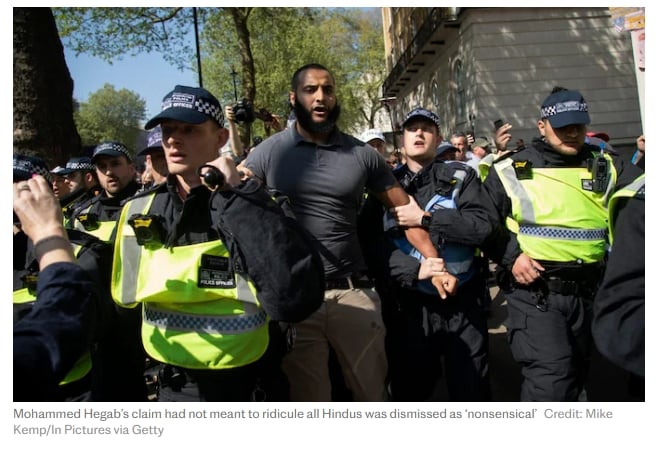Douglas Murray wins defamation claim brought by Muslim activist
From the Telegraph.
A Muslim YouTuber has lost a defamation claim he brought against Douglas Murray, the author and Telegraph contributor.
Mohammed Hegab, who posts videos under the name Mohammed Hijab, accused Murray of defaming him in a September 2022 article for The Spectator magazine.
However, a High Court judge has ruled that Hegab “lied on significant issues” in court.
 Murray had reported that Hegab, who has more than 1.3 million subscribers on the social media channel, travelled to Leicester that month when rioting broke out between Muslims and Hindus. The article said Hegab gave a speech to a group of Muslim men – mostly wearing balaclavas, hoods, masks or caps – in which he ridiculed Hindus and their belief in reincarnation. It reported that Hegab said: “If they believe in reincarnation, yeah … what a humiliation and pathetic thing for them to be reincarnated into some pathetic, weak, cowardly people like that.”
Murray had reported that Hegab, who has more than 1.3 million subscribers on the social media channel, travelled to Leicester that month when rioting broke out between Muslims and Hindus. The article said Hegab gave a speech to a group of Muslim men – mostly wearing balaclavas, hoods, masks or caps – in which he ridiculed Hindus and their belief in reincarnation. It reported that Hegab said: “If they believe in reincarnation, yeah … what a humiliation and pathetic thing for them to be reincarnated into some pathetic, weak, cowardly people like that.”
Hegab took legal action against Murray and The Spectator, arguing that he had been referring only to followers of Hindutva, the Hindu nationalist ideology.
After a four-day trial a judge ruled it was “substantially true” that he had been referring to Hindus as a whole, adding: “It was them that he was ridiculing.”
Mr Justice Johnson ruled that Hegab had given evidence that “overall, is worthless”.
Hegab had claimed the article led to him losing a £3,500-a-month deal to be a brand ambassador for the One Ummah, the charity; a £1,500-a-month advertising contract with Nature’s Blends, a supplements company; and £30,000 for a Ramadan fundraising campaign with Salam, another charity.
In a judgment on Tuesday, Mr Justice Johnson said messages that Hegab relied on for his claim had “the appearance of being contrived for the purpose of these proceedings”. It said the messages, which blamed the article for the alleged financial losses, had addressed Hegab formally despite coming from people who knew him well.
The judge noted that when he was giving evidence, Hegab was: “Combative and constantly argumentative … arguing his case rather than giving straightforward responses.”
Mr Justice Johnson also said Hegab had made an “untenable … denial of vigilantism” over his actions in Leicester and made claims that were “not credible” when he said he was unaware of having given a speech in Golders Green in front of a van displaying images of the Holocaust.
Hegab also “described the Jewish people he encountered in Golders Green as ‘Zionists’ without any objective basis”.
To be successful in any defamation claim, a litigant must show that not only were statements made about them untrue, but also that they could be harmful to their reputation. On the second of those points, the judge ruled that the article was unlikely to cause Hegab serious reputational harm because the videos he publishes on YouTube are “at least as reputationally damaging to him as the article”.
The court also heard that one of the witnesses who backed up Hegab’s claims of financial losses had previously been jailed for staging road accidents to fraudulently claim compensation.
Mr Justice Johnson found that Murray’s description of Hegab as “a street agitator who has whipped up a mob on London’s streets” was accurate.
Gentle readers, I give you Exhibit 1, M Hegab whipping up a mob on London’s streets and threatening to kill a pet dog.
